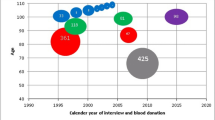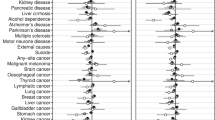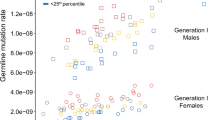Abstract
Reproductive outcomes and health of offspring were investigated in 340 patients with Hodgkin's disease first treated at Mount Vernon Hospital, Middlesex, England, at ages under 40 (females) or 45 (males) during 1970-91. Information on offspring was obtained from case-notes and postal questionnaires to the patients. Eleven men and 16 women who had conceived any children after treatment were then interviewed. There was no excess of stillbirths, low birthweight or cogenital malformations, and no cancers have occurred in the 49 offspring after treatment. There was a significant excess of twins, compared with national expectations, in offspring of female patients (RR = 8.52, P = 0.025). Aggregation of series from the literature also showed an excess of twins. Chromosomes from cultures of peripheral lymphocytes from 45 children born to 25 patients (11 men and 14 women) after treatment were examined for numerical abnormalities and for structural abnormalities at the 550 or greater band level of resolution. All were normal except in one child with Down's syndrome (47, XY, +21), for whom we found the origin of the trisomy was from the parent without Hodgkin's disease. The chromosome constitution was also abnormal in one miscarriage (69, XXY; originating from the parent without Hodgkin's disease) and one termination (45, X; for with the parental origin could not be determined) after treatment. The study adds to previous questionnaire data and for the first time provides data also from chromosome analysis, that offspring of patients treated in adulthood for Hodgkin's disease are not at greatly raised risk of genotoxic or other adverse outcomes as a consequence of their parent's treatment. The numbers of offspring assessed in the literature remains small, however, and surveillance of larger numbers of subjects is needed to enable reliable treatment-specific analyses.
This is a preview of subscription content, access via your institution
Access options
Subscribe to this journal
Receive 24 print issues and online access
$259.00 per year
only $10.79 per issue
Buy this article
- Purchase on Springer Link
- Instant access to full article PDF
Prices may be subject to local taxes which are calculated during checkout
Similar content being viewed by others
Author information
Authors and Affiliations
Rights and permissions
About this article
Cite this article
Swerdlow, A., Jacobs, P., Marks, A. et al. Fertility, reproductive outcomes, and health of offspring, of patients treated for Hodgkin's disease: an investigation including chromosome examinations. Br J Cancer 74, 291–296 (1996). https://doi.org/10.1038/bjc.1996.355
Issue Date:
DOI: https://doi.org/10.1038/bjc.1996.355
This article is cited by
-
Clinical and self-reported markers of reproductive function in female survivors of childhood Hodgkin lymphoma
Journal of Cancer Research and Clinical Oncology (2023)
-
Hodgkin's disease and birth outcome: a Danish nationwide cohort study
British Journal of Cancer (2008)
-
Ovarprotektion bei zytotoxischer Therapie
Der Gynäkologe (2005)
-
Fertilité et aneuploïdies spermatiques après traitement par radiothérapie et/ou chimiothérapie pour cancer du testicule ou lymphome
Andrologie (2003)



